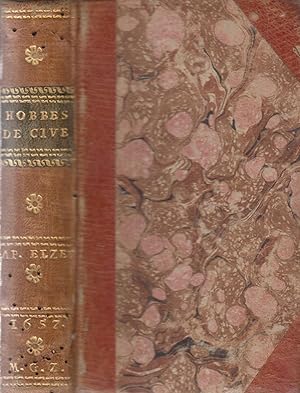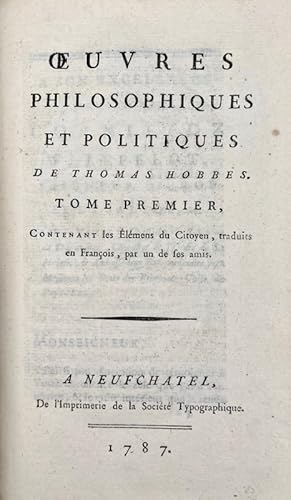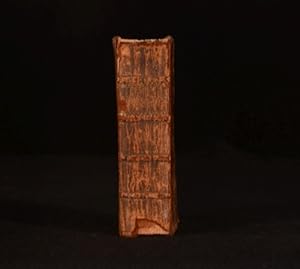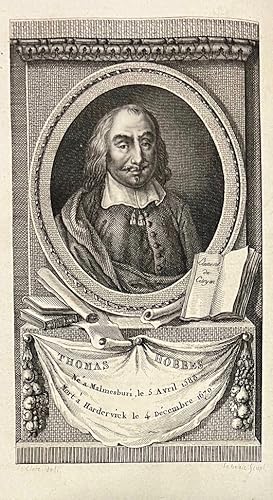thomas hobbes (Mehr als 1.200 Ergebnisse)
Produktart
- Alle Produktarten
- Bücher (1.200)
- Magazine & Zeitschriften
- Comics
- Noten
- Kunst, Grafik & Poster (1)
- Fotografien
- Karten
-
Manuskripte &
Papierantiquitäten
Zustand
Einband
Weitere Eigenschaften
Gratisversand
Land des Verkäufers
Verkäuferbewertung
-
London, Hein: Seile, 1629. Folio. Contemporary full brown calf with six raised bands, gilt line-decoration and gilt title-label to spine. Triple blindstamped borders to boards. Restored at hinges, capitals and corners, with leather slightly lighter than the original calf. With the large armorial book-plate of Robert Biddulph Phillipps Esq., Logworth Herefordshire to inside of front board as well as Phillips Libarry book-plate of St. Michael's Monastery, Belmont. A few creases to the first leaves. A(1)r darkened and dusty, and last leaf of The Table slightly darkened. Overall a very good copy. Woordcut hear- and tail-pieces and large initials. Printed within lined borders. The folded map with a tear towards outer right corner, no loss. Engraved illustrated title-page (in ten compartments with figures and scenes, by Cecill) + 32, 536 (recte: 535), (10) pp. + 2 engraved plates and three large engraved maps, one folded, two double-page. Very scarce first edition, first issue of Hobbes?s first published work, being his seminal translation of Thucydides? Eight Books on the Peloponnesian War, also constituting the first translation of the work into English from the original Greek. The work is of the utmost importance to the development and shaping of political modernity and lies at the heart of Hobbes? civil science. As Robertson says, ?For Thucydides, Hobbes?s early preference amounted to a positive affection? his business is not translating but already political instruction, which he might afterwards attempt by other means.? (See Macdonad and Hargreaves). In his ?Vita Carmine Expressa?, Hobbes said he had made the translation so that his contemporaries might learn from the fate of the Athenian democracy how much wiser one man is than the mass of men. Due to his attention to accurate research, Thucydides is considered one of the greatest ancient Greek historians. His account of the war between Athens and Sparta in the 5th century BC is one of the first works of history to combine political and ethical reflections with history writing. Thus, as curious as it may seem to some, it seems fitting that the first work to come from the pen of the towering figure of political thought should be a translation of precisely this work. "The standards and methods of Thucydides as a contemporary historian have never been bettered. He began work at the very start of the events he records, and the penetration and concentration which he devoted to his account of the "Peleponnesian War" were based on the conviction that it would prove the most important event in Greek history. Thucydides has been valued as he hoped: statesmen as well as historians, men of affairs as well as scholars, have read an profited by him" (Printing and the Mind of Man: 102) There seems to be no doubt amongst Hobbes scholars about the importance of this translation for the rest of Hobbes? political work. It can be viewed as laying the foundation for the theories for which he would later become famous. In many ways, Hobbes took ideas from Thucydides and arranged them in the highly structures framework of the first social contract theory. Both writers seem to have strikingly similar views on many of the key themes of Political Realism. Although many students of Thucydides would associate his Peloponnesian War with pro-democratic sentiments, Hobbes maintained that of all historians ?he shows how incompetent democracy is?, and Hobbes clearly focused his reading on the pro-monarchial aspects of the work in its central coverage of the decline of Athenian democracy. ?Thomas Hobbes began his career of scholar, man of letters, and philosopher by translating Thucydides? ?The History of the Penoponnesian War? apparently crystallized for Hobbes many of the ideas fundamental in his later political philosophy. In translating and studying Thucydides Hobbes was carrying on the Renaissance tradition of turning to the Greek and Roman historians with the expectation of learning how to solve the problems of modern politics.? (Richard Schlatter: Thomas Hobbes and Thucydides, p. 350). With this foundational translation, Hobbes also inscribes himself in a tradition attempting to make available to modern English readers facts and examples of historical events that showed the necessity of underpinning an ethical, English law of nations. Hobbes?s Thucydides was vitally concerned with the law of nations and concerned particularly with the legal justifications and moral obligations of empire. Hobbes published a translation of Thucydides?s History of the Peloponnesian War in 1628, long before publishing his own work on political philosophy. The translation has long been considered a masterful rendering of the ancient Greek and a work of art in its own right. Furthermore, Hobbes?s presentation of Thucydides?s writing on civil war and democracy sheds light on the opinions Hobbes expresses later in his more famous works. (From Devid Grene edt.: Translation of Thucydides? Peloponnesian War [1629], Chicago University Press, 1989). Beyond the text, Hobbes?s translation includes his introduction ?To The Readers? as well as his ?On the Life and the History of Thucydides?, which sheds light on the importance Hobbes finds that the text has for contemporary English political thought. It also contains a map representing Greece at the time of Thucydides, which Hobbes drew himself, apart from two other maps and two further illustrations. Hobbes?s great translation appeared in print several times and eventually became widely read. Although Hobbes had initially held back his first publication for some time, doubting whether he would get readers enough, he eventually published it, ?deciding to content with ?the few and better sort? ? (Mcdonald and Hargreaves). The first issue appeared in small numbers and is now extremely rare on the market. A second issue appeared in 1634 and a third in 1648. In 1676, the second edition appeared, followed by a third edition in 1723. Macdonald and Har.
-
London, Edward Blunt, 1620. 8vo. Contemporary full speckled calf, expertly rebacked to style with four raised bacds and gilt line-decoration. Front free end-paper with notes dated 1637. Note station "Lord Bacon" in early hand to title-page. P. 57 with a 20th century stamp ("Library of Washington University"). A bit closely shaved at top, occasionally cropping border. A very nice copy. (8), 222, (4 - 1 blank leaf and 1 leaf with half-title "A Discourse Upon the Beginning of Tacitus"), pp., pp. 223-324, (1 f. with half-title: A Discourse Of Rome), pp. 325-(418), (1 f. with half-title: A Discourse Against Flatterie), pp. 419-(504), (1 f. with half-title: A Discourse of Lawes), pp. 505-542. The very rare first edition of this extremely important collection of essays, three of which have now been proven to have been written by Thomas Hobbes, thus constituting his earliest published work. The work is now widely regarded a highly important source to the understanding of what is arguably the greatest political thinker of all time, providing us with unprecedented access to the early writings and thought of Thomas Hobbes. "Studies of the early Hobbes can be enriched and deepened by a consideration of the formerly anonymous texts now identified as the philosopher's earliest work, namely the essays "A Discourse on Tacitus", "A Discourse on Rome", "A Discourse on Laws", found in a larger collection entitled "Horae Subseciuae: Observations and Discourses". Originally thought to have been the work of the young William Cavendish, who under Hobbes's supervision likely wrote the majority of the "Horae" essays, these three discourses have since been identified. as the work of Hobbes himself." (Butler). "The entire work consists of twelve essays or "observations" reminiscent in style and language of Bacon's essays and devoted to such topics as arrogance, expenses, reading history, religion, and death, and four much longer discourses, three of which we have been able to attribute to Hobbes." (Reynolds & Saxenhouse p. 4). Efforts to identify the author of the "Horae Subseciuae" began almost immediately after its anonymous publication, and the publication has always been a source of speculation about the author. As it would turn out, all twelve essays were not written by the same author, and three of them were written by one of modernity's greatest philosophers. It was Leo Strauss who first provided something resembling evidence that the writings were by Thomas Hobbes. He had come upon the original manuscript and concluded that it was indeed in Hobbes's hand. But handwriting, of course, does not prove authorship. It does prove a connection, with the work, however, and the exact connection with the three essays would be proven some decades later, by Saxonhouse and Reynolds, who famously published the three essays together, under Hobbes's name for the first time. "For the first time in three centuries, this book brings back into print three discourses now confirmed to have been written by the young Thomas Hobbes. Their contents may well lead to a resolution of the long-standing controversy surrounding Hobbes's early influences and the subsequent development of his thought. The volume begins with the recent history of the discourses, first published as part of the anonymous seventeenth-century work, "Horae Subsecivae". Drawing upon both internal evidence and external confirmation afforded by new statistical "wordprinting" techniques, the editors present a compelling case for Hobbes's authorship. Saxonhouse and Reynolds present the complete texts of the discourse with full annotations and modernized spellings. These are followed by a lengthy essay analyzing the pieces' significance for Hobbes's intellectual development and modern political thought more generally. The discourses provide the strongest evidence to date for the profound influences of Bacon and Machiavelli on the young Hobbes, and they add a new dimension to the much-debated impact of the scientific method on his thought. The book also contains both introductory and in-depth explanations of statistical "wordprinting." Saxonhouse and Reynolds met each other at a conference in 1988 and decided to join forces to determine, whether Thomas Hobbes was the actual author of the "Horae Subseciuae", which had often been speculated. "Fortuitously, Reynolds was closely involved with statisticians at Bringham Young University who have done some of the most important work in developing statistical techniques for identifying authorship for disputed texts, or "wordprinting." .The results relative to the "Horae Subseciuae" were both exhilarating and disappointing. The three discourses published here could definitely be attributed to Hobbes, but the volume's twelve shorter essays or observations which draw heavily on Baconian themes and language, portraying the passionate young aristocrat with all his foibles, and the fourth discourse, were authored by someone else - perhaps Hobbes's tutee, but clearly not Hobbes himself. While it would have been more satisfying to have the entire work match Hobbes's later writings, we thought that the identification of the three discourses as previously unrecognized and unacknowledged Hobbesian works was of great significance and that they were worthy of republication. These three discourses give us direct access to Hobbes's intellectual concerns and motivating interests at a point almost two decades earlier than was possible through his previous recognized writings." (Reynolds & Saxenhouse, pp. VII-VIII). Apart from a poem in his hand, nothing had remained to help us understand the early intellectual development of Hobbes and the early influences upon his thought, before his translation of Thucydides, which appeared in 1627, when he was almost 40 years old. These important early texts give us access to Hobbes's early thought, thereby letting us understand how he developed his political science. Shortly after taking his degree, Hobbes.
-
Amsterdam, Apud Ioannem Blaeu, 1668. 4to. All eight parts bound in two excellent, contemporary full vellum bindings with yapp edges and neat handwritten titles to spines. Some sections of leaves quite browned, due to the paper quality, but the greater part of the leaves (and all the plates) is crisp and bright. An excellent copy. Woodcut printer's device to title-page, woodcut initials an vignettes, woodcut and engraved text-illustrations (diagrams). (4) pp., folded engraved portrait of Hobbes (W. Faithorne sculp)folded, 40 pp. + pp. 40,b-m, pp. 41-44 + 2 plates" 146 pp. + 1 blank + 1 plate (8), 261, (1) pp. + 1 blank + 13 plates 86 pp. + 1 blank + 8 plates (16), 174 pp. + 1 blank 42 pp. + 1 blank + 1 plate 64 pp + 5 plates" (4), 365, (15 - Indices, incl. errata and "Scripturae Sacrae") pp. + 1 blank. - I.e. fully complete, with all 30 folded, engraved plates (depicting diagrams), all half-titles, and all blanks. Conforming exactly to the Macdonald&Hargreaves collation (our copy without the "Quadratura Circuli", which, according to Macdonald&Hargreaves, is "probably a later insertion", but which "is included in some copies and has a title-page of it's own". Copies without this part, which does not actually belong to the edition, are early and more desireable. Most copies have this later inserted part and thus 31 plates). The extremely scarce first edition of the first collected edition of Hobbes' works, being the most desirable, the most sought-after and by far the most important. It is to this collected edition that one still refers when quoting Hobbes' works academically. It is furthermore here that Hobbes' seminal main work, Leviathan, appears for the first time in Latin.It is a great rarity to find all eight parts of this seminal edition, all of which were probably also sold separately from the printer, together and complete. Another edition of the work appeared later the same year, also with Amsterdam, Blaeu imprint, but actually printed in London. That edition, which is the one found in most library-holdings, is much more common and far less desireable, albeit still rare. "Il faut voir si les huit parties indiquées sur un f. après le frontispiece sont réunies dans l'exempl. Il y a une édit. moins complète faite à Londres, sous la même dat" on y lit sur le frontispice, après le nom de Blaeu: "prostant etiam Londini apud Corn. Bee". Le portrait de Hobbes, par Faithorne, a été ajouté à quelques exemplaires." (Brunet III:239-40)."According to Macdonald&Hargreaves, "[t]here seems to be no uniformity in the order of arrangement of the eight sections of this work. We have seen three (2 vol.) copies bound in the order given on *2r (q.v. in contents) and have arranged the collaction the same way." Our copy is bound in exactly this way. The hugely important "Opera Philosophica. Omnia", or "Opera Omnia" as it is often referred to, constitutes Hobbes' only successful attempt to have his philosophy published during the period. In 1662 the Licensing Act, a statute requiring that all books had to be approved in advance of publication by the Archbishop of Canterbury or the Bishop of London, was enforced, after which Hobbes found himself completely barred from having his political, theological, and historical works published. After his hugely successful 1668 Latin "Opera Omnia", printed in Amsterdam, he did not dare publish his works abroad either, however, and the "Opera Omnia" remained the only important philosophical or political work of his to be published during the period. It was a great sales success. The most important part of the 8 part comprising "Opera Omnia" is the 378 page long final part, which constitutes the editio princeps of the Latin translation of Hobbes' groundbreaking main work, the work from which the "social contract" theory originates, his seminal "Leviathan. "The Latin "Leviathan" was published towards the end of 1668 within the framework of an edition of Hobbes's collected Latin works, the so-called "Opera Omnia" [i.e. Opera Philosophica. Omnia], published with Johan Blaeu in Amsterdam. "Leviathan, sive De Metria, Forma, & Potestate Civitatis Ecclesisticae et Civilis. Authore Thoma Hobbes, Malmesburiensi" is the eighth and last piece of this collection and the only one published there (in Latin) for the first time" it is therefore the only text to receive (on its last page) a list of errata. The three chapters making up an "Appendix ad Leviatham" (and replacing the "Review and Conclusion" of the English edition) need not detain us here, as they are proper to the Latin version. We only want to note in passing that the few translations from the English "Leviathan" contained in the last chapter of his "Appendix" was worked out independently of the translation and in fact prior to it." (Rogers, Karl Schuhmann, "Thomas Hobbes Leviathan, Vol. 1", p. 241).Not only is this the first Latin edition of Hobbes' main work, it is furthermore of great importance to the study of the Leviathan and to the understanding of the development of Hobbes' thought. All later editions of the Latin version of "Leviathan" are greatly corrected and none of them appear in the same version as the present one, which provides us with the text in the form that comes closest to what Hobbes himself desired his masterpiece to be. "[.] Given these results, we may conclude that LL [i.e. the 1668 Latin Leviathan] should be counted an important source for the text of the English "Leviathan". LL is definitely more than a translation that teaches us little or nothing about the text translated. On the contrary, it is based on an independent manuscript copy of "Leviathan", and more specifically on a copy Hobbes had kept with him all the time and had apparently continued to annotate and correct. The variants of LL must therefore be treated with the greatest care wherever there are textual problems in "Leviathan", and not only in those cases in which the text of all English versions is defective. Even where it is a mat.
-
Thomae Hobbes Angli Malmesburiensis philosophi vita. [Bound with 3 other works by him.]
Verlag: Carolopoli [i.e. London]: apud Eleutherium Anglicum [i.e. William Crooke], sub signo Veritatis, 1681, 1681
Anbieter: Peter Harrington. ABA/ ILAB., London, Vereinigtes Königreich
Erstausgabe
A contemporary nonce collection of four of Thomas Hobbes's works, of which one is in first edition, one in the first collected edition, and the other two in second edition. The volume is unrestored in its original binding, and very unusual thus. All four titles are uncommon. Comprising: i) Philosophi Vita. First collected edition. "Includes 'Tho. Hobbes Malmesburiensis vita', a prose autobiography; 'Vitæ Hobbianae auctarium' by Richard Blackburne; and 'Thomae Hobbes Malmesburiensis vita carmine expressa', a verse autobiography. The first and third works were originally published separately in 1679" (ESTC). This edition precedes the two duodecimo editions of the same year. Hobbes's verse and prose autobiographies are a crucial resource for his life and thought. They laboured to establish the royalist credentials of the Leviathan, but also praised the intellectual liberty of the Interregnum and made a brazen attack on the church. Blackburne's biography, derived from John Aubrey's notes, was the first biography of Hobbes, and gives "an unusually positive view of the controversial philosopher's achievements" (ODNB). The collection underwent several editions. - ii) The Art of Rhetoric, with a Discourse of the Laws of England. London: printed for William Crooke, 1681 Second edition (first published in 1637), a translation of Aristotle's Rhetoric, also including the first appearance in print of "A Dialogue between a Phylosopher and a Student", setting forth his mature reflections of the relation between reason and law. - iii) Decameron Physiologicum: or, Ten Dialogues of Natural Philosophy. London: printed by J. C[ottrell]. for W. Crook, 1678 First edition, Hobbes's final work, published when he was over 90, a "new set of dialogues on physical questions, in the fashion of the earlier ones, but now with a stroke added at Wallis's doctrine of gravitation in the De Motu. And a demonstration of the equality of a straight line to the arc of a circle was, of course, thrown in at the end, to show him true as ever to the desperate purpose that had maintained the long quarter of a century of strife" (MacDonald & Hargreaves) - the "strife" being the Hobbes-Wallis controversy, a bitter dispute in the English scientific scene from the 1650s into the 1670s. - iv) Considerations upon the reputation, loyalty, manners, & religion, of Thomas Hobbes of Malmsbury. Written by himself, by way of letter to a learned person. London: printed for William Crooke, 1680 Second edition, first published in 1662. Hobbes's answer to the personal charges made by Wallis in Hobbius Heautontimorumenos, which accused Hobbes of deserting the king and writing the Leviathan to support Cromwell. ESTC R31111; R7393; R2630; R6871; Macdonald and Hargreaves 93; 13; 84; 64. 4 works in 1 volume, octavo (175 x 102 mm). Contemporary calf. Housed in a burgundy cloth flat-back box by the Chelsea Bindery. Portrait frontispiece in Philosophi Vita and Art of Rhetoric, folding plate in Decameron Physiologicum. Ownership notation dated May 1760 to front free endpaper, a few contemporary annotations. Bound without blank A1 in first work, with all other plates, imprimaturs and advertisements. Rubbed, slight wear at joints, holding firm, Art of Rhetoric with small paper fault in leaf C4 with loss to a few letters, some light toning. Very good.
-
Homer's Iliads in English. To which may be added Homer's Odysses Englished by the same Author.
Verlag: London: Printed by J[ames] C[ottrell] for William Crook, 1676, 1676
Anbieter: Peter Harrington. ABA/ ILAB., London, Vereinigtes Königreich
Erstausgabe
First edition of Hobbes's Iliad, in the rugged English verse of the late 17th century. These editions have often been interpreted as a means of subverting the ban on Hobbes writing controversial material. The 1676 edition is notably scarce in commerce: we trace two auction listings only in the 21st century. Hobbes's translation, which Pope knew "intimately, frequently using it as a crib" (Ball, p. 2), was written at the age of 88. In his earlier introduction to the Odyssey, Hobbes wrote that he composed the work "because I thought it might take off my adversaries from showing their folly upon my more serious writings" (quoted in Macdonald and Hargreaves, p. 58). However, since 1662 books were required to be licenced by the episcopal authorities. From that point on, Hobbes, whose rejection of the authority of the church was deeply controversial among bishops, could publish nothing further in the fields of politics, law, history, or religion. In these seemingly uncontroversial translations, Hobbes greatly strengthens the legitimacy of Greek and Trojan monarchy. He modifies the Homeric condemnations of certain monarchs, and "the gap between rulers and ruled is [made] more decisive than Homeric vocabulary allows" (Condren, p. 75). Hobbes's translation of the Odyssey was first published in 1673: William Crooke reissued works together in 1677. Provenance: Dr. Richard Luckett (1945-2020), lecturer in seventeenth-century literature at Cambridge, and Pepys Librarian at Magdalene College, with his book ticket on the front pastedown. Macdonald and Hargreaves 79. Jerry L. Ball, "The Despised Version: Hobbes's Translation of Homer", Restoration: Studies in English Literary Culture, 1660-1700, vol. 20, no. 1, 1996; Conal Condren, "The philosopher Hobbes as the poet Homer", Renaissance Studies, vol. 28, no. 1, Feb. 2018. Duodecimo (154 x 89 mm). Contemporary mottled calf, professionally rebacked with modern spine ruled in black and with red morocco label, covers bordered in gilt and with central diamond foliate motif in blind, marbled edges. With 6 pages of bookseller's advertisements between contents and text. Signature of Rev. Henry Purefoy Fitzgerald (1867-1948), naturalist, to front free endpaper. Miniscule contemporary "SHe" initials to title page. Joints neatly restored. Light rubbing, minor foxing and browning to endpapers and contents, several spots of light inking, closed tear to outer margin of H5, tape repair on recto: a very good copy.
-
Leviathan: of van de stoffe, gedaente, ende magt van de kerckelyke ende wereltlycke regeeringe.
Verlag: Amsterdam: Jacobus Wagenaar, 1667, 1667
Anbieter: Peter Harrington. ABA/ ILAB., London, Vereinigtes Königreich
Erstausgabe
First edition of the first translation of Leviathan, into Dutch, almost certainly the second edition overall following the English edition of 1651, and the text probably read by Spinoza. Leviathan offers the fullest and most famous expression of the indivisibility of sovereignty, the necessity for the state's leader to be absolute in their power, unchecked by constitutional or institutional limitations. Leviathan's thesis is exemplified by the iconic frontispiece "the State, it seemed to Hobbes, might be regarded as a great artificial monster made up of individual men. the individual (except to save his own life) should always submit to the State, because any government is better than the anarchy of the natural state" (PMM). Much influenced by the chaos of the English Civil War, Hobbes deemed stable monarchies as the most rational and effective system of governance; any restrictions or attempts at power sharing will fracture the state and risk disintegration of social order, a prospect more fearful to Hobbes than any regimen of an absolute leader. That the first translation of Hobbes's masterpiece was into Dutch was significant, given the context of the ongoing religious dispute in the Netherlands, and for its potential influence on Spinoza. The edition's "appearance may be related to the debate over toleration in the Netherlands, where the pro-toleration States party were campaigning against the orthodox Calvinist Counter-Remonstrants. As in the English context, Hobbes's anticlericalism made Leviathan a useful resource in support of a toleration agenda. Perhaps the best example of this is the use made of Leviathan's theological ideas by Spinoza in the Tractatus Theologico-Politicus (1670), a work whose political theory already owed much to a Dutch republican tradition informed by Hobbes's De Cive. The many links with Spinoza's works would ensure that Hobbes and Leviathan would be closely associated with the Dutch freethinker and condemned in the same terms, both in England and on the Continent" (Parkin, p. 450). The translation was by Abraham van Berkel (1639-1686), an associate of Spinoza and member of his circle. Spinoza at his death did not own any edition of Leviathan, but was evidently familiar with the text, and as he could not read English, he would have read either this edition, or the Latin translation of 1668. The Latin translation is admittedly the edition that was most accessible to continental readers (van Berkel's edition was suppressed by the Dutch government in 1674 and the translator driven into hiding), but given Spinoza's link with van Berkel, it is more likely that he read this edition (Fukuoka, p. 148). The text was translated from the first English edition of 1651; for the primacy of this Dutch edition compared to the two English reprints with fictitious 1651 dates, see Schoneveld (p. 58). Macdonald and Hargreaves 47. Atsuko Fukuoka, The Sovereign and the Prophets, 2018; Jon Parkin, "The reception of Hobbes's Leviathan", in Patricia Springborg (ed.), The Cambridge Companion to Hobbes's Leviathan, 2007; Cornelis W. Schoneveld, Intertraffic of the Mind, 1983. Octavo (162 x 103 mm). Contemporary vellum, spine lettered by hand at a later date, free endpapers renewed using old paper, blue speckled edges. Engraved title page and portrait of Hobbes, printed folding table. 18th/19th century ownership signatures to front pastedown. Vellum lightly soiled, binding professionally tightened, intermittent staining and general light browning to contents, slight chip to T4 shaving a couple of letters in shoulder note. A very good copy.
-
Elements of Philosophy, the First Section Concerning Body [ Part One Only ]
Verlag: Printed By R. & W. Leybourn, London, 1656
Anbieter: George Jeffery Books, HERTFORDSHIRE, Vereinigtes Königreich
Verbandsmitglied: PBFA
Erstausgabe
Full Leather. Zustand: Near Very Good. First Edition. Book measures 21.5x16.5.cm. Collation, [14],394pp, 13 plates. Bound in modern full leather, panelled boards, raised bands, leather title label, blind stamp tooling. Binding in fine condition. Internally, 1 plate repaired, some dust/dirt marking. Pages and plates in good condition. A nice well bound copy. Size: Quarto.
-
Decameron Physiologicum: or, Ten Dialogues of Natural Philosophy.
Verlag: London: printed by J. C[ottrell]. for W. Crook, 1678, 1678
Anbieter: Peter Harrington. ABA/ ILAB., London, Vereinigtes Königreich
Erstausgabe
First edition, Hobbes's final work, published when he was over 90, a contribution to the Hobbes-Wallis controversy, a bitter dispute in the English scientific scene from the 1650s into the 1670s. Decameron Physiologicum offered a "new set of dialogues on physical questions, in the fashion of the earlier ones, but now with a stroke added at Wallis's doctrine of gravitation in the De Motu. And a demonstration of the equality of a straight line to the arc of a circle was, of course, thrown in at the end, to show him true as ever to the desperate purpose that had maintained the long quarter of a century of strife" (MacDonald & Hargreaves). ESTC R2630; Macdonald & Hargreaves 684. Octavo (174 x 108 mm). Twentieth-century brown quarter morocco by John P. Gray & Son of Cambridge, rebacked, marbled sides. With folding plate. Light peripheral staining, a few leaves with minor peripheral nicks or tiny chips. A good copy.
-
Behemoth Arraign'd: or, A vindication of property against a fanatical pamphlet stiled Behemoth: or, The history of the civil wars of England, from 1640 to 1660. Subscribed by Tho. Hobbes of Malmsbury. By J. Whitehall, of the Inner-Temple, barrester at law.
Verlag: London: printed for Thomas Fox, and are to be sold at his shop, 1680, 1680
Anbieter: Peter Harrington. ABA/ ILAB., London, Vereinigtes Königreich
Erstausgabe
First edition of this vehement counterblast to Behemoth, Thomas Hobbes's history of the English Civil War. Whitehall, an Inner Temple barrister, had something of a vendetta against Hobbes, having already published The Leviathan Found Out the previous year, which had attacked Hobbes's magnum opus and accused him of sympathising with Cromwell. In Behemoth Arraign'd, Whitehall accuses Hobbes of asserting that the sovereign power has the right to arbitrarily seize the property of its citizens. Whitehall outlines the right to property and the limit of the government to seize it as the basis of liberty. Both of Whitehall's attacks on Hobbes defended the Stuart monarchy, but both also portrayed this monarchy as limited by a constitutional framework, and presented Hobbes as supporting unlimited arbitrary government, whether Stuart or Cromwellian. Whitehall also takes issue with Hobbes's attacks on the lawyers surrounding the king during the Civil War, whom Hobbes portrayed as egotistical and weakening the royalist cause - Whitehall instead defends his fellow lawyers as good men dedicated to securing peace. This was the copy of the bibliographer Gilbert Richard Redgrave (1844-1941), with his inscription to an initial binder's blank commenting on the history of Behemoth and Whitehall's response. Redgrave edited, with Alfred W. Pollard, the Short Title Catalogue of Books Printed in England, Scotland, & Ireland, 1475 1640. ESTC R12861; Wing W1865. Octavo (156 x 96 mm). Contemporary blind ruled sheep, rebacked and recornered. 19th-century bookplate of Joseph Tasker and book label of Harold E. Matthews to front pastedown. Complete with terminal advertisement leaf. Slight insect abrasion to covers, joints a little rubbed, gentle browning to contents; a very good copy.
-
Considerations upon the Reputation, Loyalty, Manners & Religion of Thomas Hobbes of Malmsbury. Written by himself, By way of Letter to a Learned Person.
Verlag: London: William Crooke, 1680, 1680
Anbieter: Peter Harrington. ABA/ ILAB., London, Vereinigtes Königreich
Erstausgabe
Second edition, originally published in 1662 as Mr. Hobbes Considered in his Loyalty, Religion, Reputation, and Manners. "This is Hobbes's answer to the personal charges made by John Wallis in his Hobbius Heauton-timorumenos 1662, in which Hobbes was accused of deserting the King and writing the Leviathan in support of Cromwell's title. As Wallis had deciphered Royalist correspondence captured at Naseby for the benefit of the Parliamentarians, Hobbes tells here his and Wallis's 'little stories during the time of the late rebellion' with such effect, as G. C. Robertson notes, that Wallis, like a wise man, attempted no further reply." (MacDonald and Hargreaves). ESTC R6871; Macdonald and Hargreaves 64. Octavo (168 x 105 mm). Twentieth-century half calf and marbled boards, morocco label, edges stained red. 9-page bookseller's catalogue at end. Contemporary ownership initials to title. Marginal tear repaired to two leaves, one or two small rust spots; a very good copy.
-
Leviathan, sive De Materia, Forma, & Potestate Civitatis Ecclesiasticaæ et Civilis (Leviathan, or the Matter, Form & Power of a Commonwealth, Ecclesiastical and Civil).
Verlag: Joannem Blaeu, Amstelodami, 1670
Anbieter: Athena Rare Books ABAA, Fairfield, CT, USA
Erstausgabe
FIRST SEPARATE LATIN EDITION. TP + [i]-[ii] = Dedication + 1-365 + [366]-[368] = Index Capitum + [369]-[378] = Index + [379] = Scripturæ Sacræ & Erratum + 1 blank leaf, small Quarto. First Separate Latin Edition (MacDonald & Hargreaves #45). The Important First Separate Latin Edition of Leviathan with all of Hobbes' Final RevisionsThis is the first separate edition of this book (M&H #45) from 1670. This Latin text first appeared two years earlier in the Opera Philosophica also published by Joannem Blaeu (M&H #104) which contained eight different works by Hobbes. During an age when English was little spoken and rarely read across the Channel, this Latin version is tremendously significant because it made Hobbes' most important and controversial work (first published in 1651) finally accessible to European readers. This Latin edition was, then, essential to the dissemination and understanding of Hobbes' ideas within the scholarly community of his day. Over and above that important distinction, this volume contains an entirely new Appendix - presented in a "Question & Answer" format - with sections devoted to the Nicene Creed, to Heresy and Replies to Objections. Moreover, as MacDonald and Hargreaves note in their Addendum, "The Latin version of Leviathan differs considerably from the English: it is the Latin versions in which Hobbes really expressed his opinions In his Latin version he was less concerned with personalities" (M&H, p. xvi). Contemporary full calf binding with five raised bands and a red field with gilt lettering for title and author to the spine. The corners and edges are all pretty uniformly worn, but this is a sound and solid binding. Overall, a lovely copy of this important work by Hobbes and his major contribution to what Johnathan Israel has termed The Radical Enlightenment. ADDITIONAL PHOTOS AVAILABLE UPON REQUEST.
-
Leviathan: of van de stoffe, gedaente, ende magt van de kerckelycke ende wereltlycke regeeringe.
Verlag: Tot Amsterdam, by Jacobus Wagenaar 1667, 1667
Anbieter: Antiquariaat Matthys de Jongh, Zutphen, Niederlande
Erstausgabe
. [XVI],744,[64]p. With an engraved frontispiece, engraved portrait and folding table. Contemp. overlapping vellum, some dust soiling. Mild browning throughout, some gatherings heavier due to paper quality, as is usual for this book. First Dutch edition, first issue. This translation has been attributed to Abraham van Berckel (or Berkel) (1639/40-1686), a physician, classicist and freethinker, and a good friend of Spinoza. It was forbidden by the Court of Holland on 19 July 1674 as blasphemous and pernicious for the soul'.Hobbes' influence on Spinoza's political ideas seems indisputable. A Latin translation of Leviathan' appeared in 1668 in Amsterdam when Spinoza was working on his Tractatus', and he had a copy of Hobbes' De cive' in his library. *Macdonald & Hargreaves 47. Knuttel, Verboden boeken' 185.
-
Elemens philosophiques du Citoyen. Traicté politique, où Les Fondemens de la Société civile sont descouverts, par Thomas Hobbes, et Traduicts en François par un de ses amis.
Verlag: de l'Imprimerie de Jean Blaeu, A Amsterdam, 1649
In-12 de 24 ff.n.ch. (y compris le frontispice gravé) 448 pp. 8 ff.n.ch., maroquin rouge, dos lisse orné, filet et roulette dorés d'encadrement sur les plats, dentelle intérieure, tranches dorées (relié vers 1800). Deuxième édition française donnée par Samuel Sorbière. Frontispice gravé portant Les Fondemens de la politique.« La seconde édition est mieux imprimée que la première et d'un format un peu plus grand » (Brunet). Cette édition a l'avantage de contenir à la suite du texte un Advertissement du Traducteur adjousté après la publication de cet Ouvrage, pièce de 15 pages qui n'est pas dans la première édition.Bel exemplaire. Brunet, III, 240.
-
Leviathan, sive De Materia, Forma, & Potestate civitatis ecclesiasticae et civilis
Verlag: Apud Joannem Blaeu, Amstelodami [i.e. Amsterdam], 1670
Anbieter: Antiquates Ltd - ABA, ILAB, Wareham, Dorset, Vereinigtes Königreich
Erstausgabe
First separate Latin edition. [4], 365pp, [15]. Later full vellum, contrasting red calf lettering-piece, all edges red. Extremities discoloured and lightly rubbed. Later paper repair to verso of front blank fly-leaf, early manuscript note to recto: 'Leviathan / Thomae Hobbesii / Malmesburiensis / Theomachi / pernicies juvenium, morum corruptela, / ingenioisima subtillissima omnis / religionis eversio diabolica. / Diaboli stercus. / Parve nec invideo, per me, liber, ibis in igneis / hei mihi quo domino, non licet ire tuo.', short tear to leaf L2 (not affecting text), later manuscript notes to p.103 and p.106. The first separate Latin edition of the Leviathan. Hobbes prepared the translation himself, editing the text and including three apologetic dialogues in place of the original 'Review and Conclusion'. His translation first appeared in Opera philosophica quae Latine scripsit omnia, published by Blaeu in 1668. Size: Quarto.
-
The Moral and Political Works of Thomas Hobbes of Malmesbury. Never Before Collected Together. To Which is Prefixed, the Author's Life, Extracted From That Said to be Written by Himself, as also from the Supplement to the Said Life by Dr. Blackbourne; and Farther Illustrated by the Editor, With Historical and Critical Remarks on His Writings and Opinions
Verlag: Not Stated, London, 1750
Anbieter: Rooke Books PBFA, Bath, Vereinigtes Königreich
Verbandsmitglied: PBFA
Erstausgabe
Leather. Zustand: Good Only. None (illustrator). First edition. A very scarce first edition collection of the moral and political works of Thomas Hobbes, this being the first time his works were collected in one volume. The first edition of this very scarce work, the first collected edition of the works of Thomas Hobbes.ESTC citation number T112688.Illustrated with an engraved title page and one plate. Collated, complete.With an additional lavishly engraved title page entitled 'Leviathan'.A collection of the works of Thomas Hobbes.Hobbes was an English philosopher active during the seventeenth century, largely considered to be one of the founders of modern political philosophy.This volume includes Hobbes' best known work on which he worked during the English Civil War, 'Leviathan', in which he looks at the structure of society and legitimate government, and is one of the earliest and influential works of social contract theory.This 1750 publication was the first time Hobbes' works had been published as a complete collection - the next was complete edition of his work was not published until 1839. In a rebacked half morocco binding with calf to the boards. Externally, front board is detached but present. Boards and spine are both rubbed, resulting in some loss of leather to the boards. A little loss to the head of the spine. Minor bumping to the tail of the spine and to the extremities. Spine is a little faded. Institutional stamps to the paste downs and endpapers. Internally, firmly bound. Pages are lightly age-toned and generally clean with some spots and light handling marks. An ex-institutional copy, with stamps to the engraved title page, title page, and to a couple of other pages. Front endpaper and engraved title page are detached with the front board. Good Only. book.
-
Hobbs's Tripos, in Three Discourses: The first, Humane Nature, Or the Fundamental Elements of Policy. Being a Discovery of the Faculties, Acts and Passions of the Soul of Man, from their Original Causes, according to such Philosophical Principles as are not commonly known, or asserted. The second, De Corpore Politico. Or the Elements of Law, Moral and Politick, with Discourses upon several Heads, as of the Law of Nature, Oaths and Covenants; several kinds of Governments, with the Changes and Revolutions of them. The third, Of Liberty and Necessity; Wherein all Controversie, concerning Predestination, Election, Free-will, Grace, Merits, Reprobation, is fully decided and cleared.
Verlag: London: Printed for Matt. Gilliflower, Henry Rogers, and Tho. Fox, 1684, 1684
Anbieter: Peter Harrington. ABA/ ILAB., London, Vereinigtes Königreich
Erstausgabe
First collected edition, including the two texts forming The Elements of Law, together with Of Libertie and Necessitie. The register and pagination is continuous. The Elements of Law, a strong defence of royal authority, was originally published in 1650 in two parts - Humane Nature and De Corpore Politico. These focus on human psychology and the origins of the state respectively, and foreshadow many of the arguments in Leviathan (1651), including the indivisibility of sovereignty. These works were circulated in manuscript form in 1640 and established Hobbes's reputation as an apologist for royal absolutism. The Long Parliament's attack of these ideas caused him to flee to Paris, where he remained until 1652. Of Libertie and Necessitie, originally published in 1654, developed from a heated debate with John Bramhall, bishop of Derry, in Paris in 1645. The work outlines Hobbes's position on free will and so is thematically closer to Humane Nature. This edition is rather confusingly called "The Third Edition" on the title page. Provenance: Douglas Cleverdon (1903-1987), broadcaster and bookseller, with his bookplate on the front pastedown. Macdonald & Hargreaves 103; Wing H2266. Octavo (179 x 109 mm). Contemporary calf, spine and covers panelled in blind, raised bands. Bound without initial blank. Engraved head- and tailpieces, divisional titles, title page ruled in red. Recent bookplate of the Fox Pointe Collection to rear pastedown. The name "Ash" written in small letters on the upper outer corner of front free endpaper. Joints and extremities neatly restored. Light bumping, minor browning and foxing to endpapers and contents, lower outer corner of front free endpaper torn away, two small chips to outer margin of title page [Humane Nature]: a very good copy.
-
The Creed of Mr. Hobbes Examined; In a feigned Conference Between Him and a Student in Divinity. The second Edition, much Corrected.
Verlag: London: Printed for Francis TytonÉ 1671., 1671
Anbieter: Michael R. Thompson Books, A.B.A.A., Los Angeles, CA, USA
Erstausgabe
Thomas Tenison (1636Ð1715) was a prominent English churchman who became archbishop of Canterbury in 1695. He administered to both William and Mary at their deathbeds, though he was less popular with Queen Anne. He was a founder of the Society for the Propagation of the Gospel. G.A.J. Rogers discusses this work at length in the Dictionary of Seventeenth-Century British Philosophers. He notes that ÒTenison recognized the intellectual power in HobbesÕs philosophy, and this made him a much more worthy critic than many who took up the sword against Hobbes.Ó The book is written in the form of a dialogue between ÒHobbesÓ and Òa Student,Ó who represents Tenison. The Student attacks HobbesÕ conception of a deity and states that ÒHobbesÓ fails to distinguish between having an idea of God and having an image of God, noting that we cannot have an image of a non-material God, but we can have an idea of one. This leads to an examination of the nature of space and the coherence of the doctrine of the Trinity, the possibility of an infinite cause, the possibility of the universe having a beginning, and the coherence of immaterial substances. ÒTenison provides powerful argument for his non-materialist position and challenges HobbesÕs claims in forceful ways. He does so without seriously distorting HobbesÕs own position, which gives the whole work a strength often lacking in anti-Hobbist literature of the period. Although it is TenisonÕs only truly philosophical work it provides considerable evidence of his intellectual sophistication, and shows that debate with Hobbes in the seventeenth century could be philosophically fruitfulÓ (ibid, p. 809). Octavo. [24], 263, [1. errata] pp. Contemporary calf, gilt-ruled spine. Front joint with 1 Ó split, corners lightly worn. A very good, unsophisticated copy. Wing (CD-ROM, 1996), T692. Second edition, corrected and slightly expanded. Though ESTC notes quite a few copies in British libraries, this work is fairly scarce in American libraries, especially newer ones, there being ten copies of the first edition and seven copies of this edition in North American libraries. It is even scarcer on the market today, with no auction records in recent decades.
-
Hobbs's Tripos, in Three Discourses: The first, Humane Nature, Of the Fundamental Elements of Policy. Being a Discovery of the Faculties, Acts and Passions of the Soul of Man, from their Original Causes, according to such Philosophical Principles as are not commonly known, or asserted. The second, De Corpore Politico. Or the Elements of Law, Moral and Politick, with Discourses upon several Heads, as of the Law of Nature, Oaths and Covenants; several kinds of Governments, with the Changes and Revolutions of them. The third, Of Liberty and Necessity; Wherein all Controversie, concerning Predestination, Election, Free-will, Grace, Merits, Reprobation, is fully decided and cleared.
Verlag: London: for Matt. Gilliflower, Henry Rogers, and Tho. Fox, 1684, 1684
Anbieter: Peter Harrington. ABA/ ILAB., London, Vereinigtes Königreich
Erstausgabe
First collected edition, somewhat confusingly called "The Third Edition" on the title, comprising the two texts which form The Elements of Law, together with a third text. The Elements of Law was originally published in 1650 in two parts, Humane Nature, and De Corpore Politico, both with subsequent separate editions. It had circulated in manuscript in 1640. "Starting with an account of human psychology and a powerful analysis of the origins (and the necessity) of the state, it mounted a strong defence of royal authority in such matters as the imposition of taxation" (ODNB). In so doing Hobbes foreshadowed many of the ideas which he would put forward in Leviathan in 1651, namely, the indivisibility of sovereignty. The third part, "Of Libertie and Necessitie", dates from after Hobbes's return to England in 1651, when he "became embroiled in a heated debate with John Bramhall, bishop of Derry, Ulster, on the subject of free will. In 1645, in Paris, Hobbes had discussed the problem of free will with the bishop, and they both wrote their views on the matter soon afterward. A young disciple of Hobbes published his contribution in 1654, without Hobbes's consent" (The Encyclopedia of Philosophy, IV, p. 32). Though included with the Elements of Law here, it has no broader connection to the other two parts. ESTC R12077; Macdonald & Hargreaves 103; Wing H2266. Octavo (178 x 113 mm). Twentieth-century calf, marbled sides. Bound without initial blank. 19th-century inscription to title page of reverend Thomas Wesley Freckelton (1827-1903), author of The Church and the Drama (1865), and Religion and Modern Thought (1893). A few pin-sized holes to spine, early inscription to title page, some light browning and peripheral staining, small chip to bottom corner of T2 not near text. A good copy.
-
2 ouvrages reliés en un volume in-12 (153 x 96 mm), plein veau marbré de l'époque, dos lisse entièrement orné d'un décor doré à la grotesque, pièce de titre de maroquin bordeaux, tranches rouges. 1- Première édition de la traduction française fournie par le baron d'Holbach, de cette oeuvre qui exerça une influence décisive sur sa propre doctrine comme sur la philosophie politique des Lumières. "Diderot nous a laissé un témoignage de l'enthousiasme que suscita chez lui ce traité [in 'Lettre à Sophie Volland']. Bien des éléments de cette doctrine passeront dans le 'Système de la Nature', avant tout le sensualisme conséquent, le mécanisme et le relativisme des critères moraux et sociaux" (cf. Naville, 'Holbach', p. 218-224). Par ailleurs, dans le domaine moral comme politique, tout sépare Hobbes de d Holbach, lequel se prononce en faveur de la perfectibilité humaine, contre l état de nature hobbesien et contre le principe du pouvoir absolu. L adresse de Londres est fictive. L ouvrage a été imprimé à Amsterdam chez Marc-Michel Rey. (Conlon, 'Siècle des Lumières', 72:860. Garcia, 'Hobbes: Bibliographie Intle', p. 8. Vercruysse, 'Holbach', éd. 2017, 1772/D2. Tchemerzine-Scheler, III, 729). 2- Edition originale et unique de cet essai, développement de l'article "Usure" que l'auteur avait rédigé pour l'Encyclopédie. Faiguet de Villeneuve livre ici une vigoureuse défense du prêt à intérêt et réfute les critiques traditionnelles de l'Église et de la loi en la matière, tant par des arguments religieux, qu'économique et sociaux. Il démontre que le prêt favoriserait le commerce et l'industrie et permettrait aux hommes entreprenants de développer leurs compétences en créant une dynamique favorable entre détenteurs des capitaux et entrepreneurs. Au cours de sa démonstration, l'auteur propose une réforme de la poste afin que la forme et le poids réglementent le prix du port. Joachim Faiguet de Villeneuve (1703-1780), économiste et philanthrope a été un collaborateur régulier de L'Encyclopédie. Il obtint la charge de trésorier de France au Bureau des Finances de Châlons-sur-Marne; il est considéré comme l'un des créateurs en France de la science de l Économie politique. (Conlon, 'Siècle des Lumières', 70:874. Goldsmiths'-Kress, n°10683.3. Higgs, n°5043. INED, n°1773). Mors légèrement frottés. Très bon exemplaire, très frais, bien relié à l'époque.
-
uvres philosophiques et politiques. Tome premier, contenant les Élémens du Citoyen, traduits en François, par un de ses amis; [together with] Tome second, contenant le Corps Politique & la Nature humaine.
Verlag: Neufchatel: de l'Imprimerie de la Société Typographique, 1787, 1787
Anbieter: Peter Harrington. ABA/ ILAB., London, Vereinigtes Königreich
Erstausgabe
First collected edition in French. It includes the young Huguenot intellectual Samuel Sorbière's popular translation of "De cive" (first 1649); a translation of "De corpore politico", long attributed to Sorbière but now thought to have been by prolific translator John Davies (Malcolm, pp. 464-5); and "Human Nature" translated by the prominent French Enlightenment figure Paul-Henri Thiry, Baron d'Holbach (first 1772). See Noel Malcolm, Aspects of Hobbes. Oxford: Oxford University Press, 2002. 2 volumes, octavo (198 x 123 mm). Contemporary tree calf, green and red morocco labels, spine with rope-twist edge-roll, floral lower band, and attractively decorated compartments in gilt, boards bordered in gilt rule and dotted roll, marbled endpapers and edges. Engraved portrait frontispiece to volume 1. Bookseller's description pasted to front pastedown of volume 1. Extremities lightly worn, a few spill-burns to boards and some minor stripping to rear board of volume 1, hinges cracked but firm, contents bright with occasional spotting, overall a very good set.
-
The History of the Civil Wars of England from the Year 1640 to 1660
Verlag: Published by [unknown], [unknown], 1679
Anbieter: Keoghs Books, Skipton, Vereinigtes Königreich
Verbandsmitglied: PBFA
, [2] 286 pages, this book was written in 1668 but Charles II refused to allow it to be published in England although pirated copies were published in Europe throughout the 1670s. Three years after Hobbes' death his literary agent, William Crooke, published an official version. This copy is marked as a second edition and dated 1679 on the title page so is probably a second edition of the official version printed for William Crooke. It was published in 1680 under the title Behemoth Second Edition , the book is rubbed at all edges, bumped at corners, has a small tear to tail of spine, pastedowns and end papers are missing, small closed tear to outer edge of title page and pages 69 -80 ( on page 70 the first letters on 4 line are missing due to tear ) , pages with I and K signatures are misnumbered with all pages being present, p272 and 273 misnumbered 282 and 283, p276 and 277 misnumbered p286 and 287, very occasional foxing through out (mostly in margins), text block is clear and tight in its binding, good condition , brown calf with gilt thistle design to spine, blindtamped borders to boards , small octavo, 16.5cm x 11cm Hardback ISBN:
-
Elementa Philosophica de Cive; Epistolica Dissertatio de Principiis Ivsti, et Decori, Continens Apologiam pro Tractatu Clarissimi Hobbaei, De Cive; & Thomae Hobbes Angli Malmesburiensis Philosophi Vita [3 volumes in 1]
Verlag: Published by Danielem Elzevirium; Ludovicum Elzevirium; Eleutherium Anglicum 1651-1681, Amstelodami [Amsterdam] & Carolopoli [London], 1651
Anbieter: Keoghs Books, Skipton, Vereinigtes Königreich
Verbandsmitglied: PBFA
Erstausgabe
, 3 volumes in 1, [34], 403 pp; [16], 269 pp, [2]; [16], 128 pp, first volume with engraved tile page, 'Vita' volume with portrait frontispiece, 'Elementa Philosophica' - 4th Edition (1669), 'Epistolica Dissertatio' - 1st Edition (1651) & 'Vita' - 1st Edition (1681) Fourth and First Editions , vellum soiled at spine and lightly stained on covers, previous owner's notes in latin on front pastedown, owner's name and date at lower margin of title page, a little underlining at the start, front hinge cracked but holding firm, front free endpaper missing, pages generally clean, neat repair to fore-edge of title page to second volume, cigarette odour, a good tight copy , full vellum with yapped fore-edges, printed paper title label on spine 12mo, 14 x 8.5 cm Hardback ISBN:
-
Le corps politique ou les elements de la loy morale et civile. Avec des Reflections sur la Loy de Nature, sur les Serments, les Pacts, & les diverses sortes de Gouvernemens; leurs changemens, & leurs revolutions. Par Thomas Hobbes, Anglois. Traduit d'anglois en françois par un de ses amis.- [Sigue:] Le politique du temps, Traitant de la puissance, autorité, & du devoir des Princes: des divers Gouvernemens, jusques où l'on doit supporter la tyrannie. Et si en une oppression extréme il est loisible aux sujets
Verlag: (1ª): [S.l.: s.n.], 1652.- (2ª): [S.l.: s.n.], 1650, 1650
Buch Erstausgabe
Encuadernación de tapa dura. Zustand: Muy bien. 1ª Edición. [Para pedidos desde fuera de España, por favor, consulte las condiciones de venta y envío, tipo A. / For orders to be delivered outside Spain, please, let you see our sale and shipping terms, type A. / Pour les commandes à livrer hors d'Espagne, s'il vous plait, voyez les conditions de vente et de livraison, type A].- // 1ª edición en francés del libro de Hobbes.- // 2 obras encuadernadas juntas.- // 8º, (páginas de 130x78 mm.).- 1ª obra, 'Le corps politique.': [8], 180 p., [2] h. blancas; sign.: à4, A-P8 [P7-P8, blancas]; frontispicio grabado; adorno tipográfico en portada; iniciales y frisos grabados.- 2ª obra, 'Le politiqve dv temps.': 250 p.; sign.: A-V8/4, X5; iniciales y frisos grabados; apostillas marginales.- // Encuadernación de época en pergamino a la romana; lomo liso con título manuscrito; cortes jaspeados en rojo. Manchas leves en los planos; lomo oscurecido. 1ª obra: pequeño trozo de papel pegado sobre el fontispicio; recortado el papel original del bajo de la portada, pérdiéndose únicamente la fecha, pero remarginado; cerco de antigua mancha de humedad en margen superior de las primeras 100 páginas. Bien presentes las 2 h. blancas del final de la 1ª obra. Algunos subrayados a lápiz.- 2ª obra: También recortado el papel original del bajo de la portada, pérdiéndose la mención 'Iouxte la Coppie Imprimée à Paris. M.DC.L', pero remarginado. Sin anotaciones ni subrayados.- // Proc.: Sin datos.- // Refs.: 1ª obra: Brunet, III, c241 nota; Lelong-Fontette, II, 17088; MacDonald, 20; Willems, 725 nota; 2ª obra: Barbier, III, c.945; Lelong-Fontette, II, 27243.- // Tras el éxito, en 1649, de sus anteriores traducciones de las obras de Hobbes 'De Cive' (Les fondemens de la politique) y 'Philosophical elements of a True Citizen' (Elemens philosophiques du citoyen), Samuel Sorbière (1615-1670) tradujo en 1650 el 'De Corpore politico, or the Elements of law, moral and politick', que se acababa de imprimir ese mismo año en Inglaterra sin la autorización de Hobbes. Parece que esta primera edición de la traducción fue impresa por los Elzevier, aunque sin indicación ni de lugar ni de imprenta y con una calidad que llevó a Willems a sugerir que se imprimió fuera de Holanda. La edición lleva un reseñable frontispicio, del que carecerán las ediciones elzeverinas posteriores. Un frontispicio tan representativo de las ideas de Hobbes, que ha venido siendo reproducido en numerosas ediciones en distintos países para las portadas de las traducciones de diversas obras de Hobbes. De corpore politico es uno de los tres textos que Hobbes dedicó a la filosofía política. Publicado sin su consentimiento, se trata de la segunda parte del texto que se conocerá más adelante como The Elements of Law, Natural and Politic y se centra en la situación de guerra entre los hombres que procede de su libertad original, para examinar que modo de organización política es el más adecuado. Por su parte, la segunda de las obras encuadernadas en este volumen, el anónimo Le politique du temps, es un panfleto protestante escrito en 1574, de autor todavía desconocido, correspondiente a la reacción monarcómana contra Catalina de Médicis. Se sabe porque, igual que hizo con otros panfletos (como el Contra uno, de Étienne de la Boètie), el calvinista Simon Goulart lo transcribió en el exilio, dentro de sus 'Memoires de l'estat de France sous Charles IX' (t. III, p. 80., en la 1ª ed. de 1577, y t. III, p. 61, en la 2ª ed., de 1578). A esas dos transcripciones les siguieron dos ediciones sueltas: primero esta, impresa en La Haya en 1650, y la publicada en 1704, según Barbier, en París, ambas muy raras en comercio. En el panfleto se argumenta, a través del diálogo entre dos personajes, para establecer que sin un pacto entre el pueblo y el monarca no puede haber orden, necesario, ya que su autor repudiaba tanto la anarquía como la tiranía. De ahí el sentido de que en el volumen se encuadernen ambas obras, ya que el contenido de ambas defiende esa misma posición: la necesidad.
-
The Peloponnesian War; 2-Volume Set
Verlag: University of Michigan Press, Ann Arbor, MI, 1959
Anbieter: Denali Bay, Silver Spring, MD, USA
Hardcover. Zustand: Fine. First Edition; 2 Volume box set. 2 book box set including box in very good condition.
-
Elemens philosophiques du citoyen. Traicté politique où les Fondemens de la Societé civile sont découverts, par Th.Hobbes et traduit en françois par un de ses amis [Sam. Sorbière]
Verlag: de l Imprimerie de Iean Blaeu, Amsterdam (Paris), 1649
Anbieter: Libreria Ex Libris ALAI-ILAB/LILA member, Roma, Italien
Legatura 800 in mz. pelle con fili, fregi e tiolo oro al ds. (lievi abrasioni). Tagli colorati. Firma di appartenenza al frontis. e margine superiore sobrio ma, nel complesso, bell esemplare. Prima traduzione francese degli Elementa philosophiae di Hobbes. Nel 1649 uscirono due edizioni - come ricorda Brunet, III, 240 - di questa traduzione: la nostra è la seconda edizione che, oltre ad essere meglio impressa e di formato leggermente più grande della prima, contiene di seguito un testo ( Advertissement du traducteur adjousté apres la publication de cet Ouvrage ) che non è nell edizione precedente. 8vo (cm. 15,2), 24 cc.nn., 448 pp., 8 cc.nn. Antiporta fig.
-
Elementa Philosophica de Cive
Verlag: Amsterodami: Ludovicum & Danielem Elzevirios, 1657
Anbieter: Leipziger Antiquariat, Leipzig, Deutschland
Buch
13,0 x 8,0 cm, Halblederband. Zustand: Gut. 403 Seiten Zustand: Einband etwas berieben, Ecken und Kanten etwas bestoßen, Rücken leicht aufgehellt, am Rücken und am unteren Rückenfalz des Nachsatzes etwas Wurmfraß, mit wenigen Anstreichungen, Bindung haltbar und fest, insgesamt gut erhalten la Gewicht in Gramm: 240.
-
Oeuvres philosophiques et politiques de Thomas Hobbes.
Verlag: de l'Imprimerie de la Société Typographique, A Neufchatel, 1787
2 vol. in-8 de XLVIII-452-(18) pp. ; (4)-IV-292 pp., veau fauve, dos lisses ornés, pièce de titre et de tomaison en maroquin vert, triple filet doré sur les plats (reliure de l'époque). Édition de la traduction de Samuel Sorbière, reprenant aussi la traduction du Traité De la nature humaine faite par Holbach, ici en seconde édition.Tome I : Eléments du Citoyen, traduits par Samuel Sorbière. Tome II : Le Corps politique traduit par Sorbière et La Nature humaine dans la traduction du baron d'Holbach.Portrait de l'auteur gravé sur cuivre par Le Beau d'après Le Clère. Très bon exemplaire.Vercruysse, 1772 D1, 1787 D1.
-
Elementa Philosophica de Cive and Eyphma Compendiarium in Religione Christiana Novum
Verlag: Job. Frid and Joh. Wittigau c1674-1696, Zeidlerum and Lipsiae, 1674
Anbieter: Rooke Books PBFA, Bath, Vereinigtes Königreich
Verbandsmitglied: PBFA
Leather. Zustand: Good. None (illustrator). A sought after collection of scarce philosophical works from early English political philosopher, Thomas Hobbes of Malmesbury. Written in Latin. Thomas Hobbes was one of the founders of modern political philosophy. His understanding of humans as being matter and motion, obeying the same physical laws as other matter and motion, remains influential; and his account of human nature as self-interested cooperation, and of political communities as being based upon a "social contract" remains one of the major topics of political philosophy. Hobbes was a champion of absolutism for the sovereign but he also developed some of the fundamentals of European liberal thought: the right of the individual; the natural equality of all men; the artificial character of the political order (which led to the later distinction between civil society and the state); the view that all legitimate political power must be "representative" and based on the consent of the people; and a liberal interpretation of law which leaves people free to do whatever the law does not explicitly forbid. Two works bound as one. First volume dated from COPAC using pagination and publisher. Preface present from the 1646 edition. Featuring an engraved title page, decorative head and tail pieces and illuminated capitals. In contemporary calf binding. Externally, rubbed with wear to the extremities and spine. Slight loss to the tail of the spine and rear hinge is very slightly starting. Internally, generally firmly bound, although with the odd leaf working slightly loose. Light instances of spotting throughout and with some uncut pages. Ink signature to the front free endpaper. Good. book.
-
Oeuvres philosophiques et politiques de Thomas Hobbes.
Verlag: de l'Imprimerie de la Société Typographique, A Neufchatel, 1787
2 vol. in-8 de XLVIII-452-(18) pp. ; (4)-IV-292 pp., basane marbrée, dos lisses ornés, roulette dorée sur les plats, pièces de titre et de tomaison en maroquin vert (reliure de l'époque). Édition de la traduction de Samuel Sorbière, reprenant aussi la traduction du Traité De la nature humaine faite par Holbach, ici en seconde édition.Tome I : Eléments du Citoyen, traduits par Samuel Sorbière. Tome II : Le Corps politique traduit par Sorbière et La Nature humaine dans la traduction du baron d'Holbach.Portrait de l'auteur gravé sur cuivre par Le Beau d'après Le Clère. Ex-libris (XVIIIe) Claude-Meriadec Pierret Chanterennes, originaire de la ville de Sézanne. Bon exemplaire.Vercruysse, 1772 D1, 1787 D1.
-
Ouvrage traduit de l'anglois. Londres, [i.e. Amsterdam : s.n.], 1772, 11x16, 2 hojas, IV-171 págs. Encuadernado en holandesa de época, lomera en piel con pequeños hierros en seco y ruedas doradas en lomera, cortes jaspeados. Perfecto estado. (Primera traducción francesa de Humane Nature de Hobbes, que apareció mucho después de su publicación en 1650. Aunque la obra fue traducida de forma anónima, Diderot la atribuyó a Holbach en una carta a Naigeon en abril de 1772). (57455).


![Bild des Verkäufers für Eight Bookes of the Peloponnesian Warre. Interpreted with Faith and Diligence Immediately out of the Greeke by Thomas Hobbes. - [FIRST EDITION, FIRST ISSUE OF HOBBES'S FIRST PUBLISHED WORK] zum Verkauf von Lynge & Søn ILAB-ABF](https://pictures.abebooks.com/inventory/md/md31130609072.jpg)
![Bild des Verkäufers für Horae Subsecuiae. Observations and Discourses. - [HOBBES' EARLIEST PUBLISHED WORK] zum Verkauf von Lynge & Søn ILAB-ABF](https://pictures.abebooks.com/inventory/md/md31434128036.jpg)
![Bild des Verkäufers für Opera Philosophica, Quae Latinè scripsit, Omnia. Antè quidem per partes, nunc autem, post cognitas omnium Objectiones, conjunctim & accuratiùs Edita. [8 parts]. [Including "leviathan" for the first time in Latin]. - [CONTAINING THE EDITIO PRINCEPS OF THE LATIN TRANSLATION OF "LEVIATHAN"] zum Verkauf von Lynge & Søn ILAB-ABF](https://pictures.abebooks.com/inventory/md/md22791448026.jpg)
![Bild des Verkäufers für Thomae Hobbes Angli Malmesburiensis philosophi vita. [Bound with 3 other works by him.] zum Verkauf von Peter Harrington. ABA/ ILAB.](https://pictures.abebooks.com/inventory/md/md31207214481.jpg)
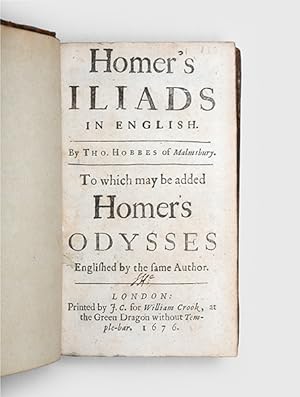
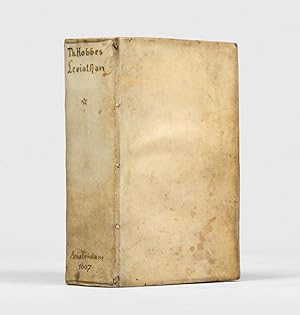
![Bild des Verkäufers für Elements of Philosophy, the First Section Concerning Body [ Part One Only ] zum Verkauf von George Jeffery Books](https://pictures.abebooks.com/inventory/md/md30977835620.jpg)
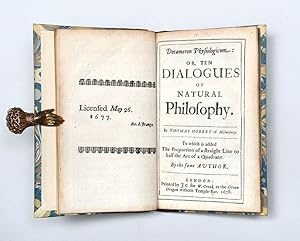

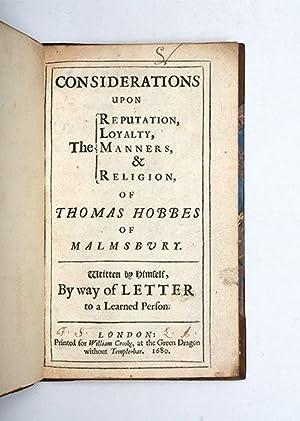
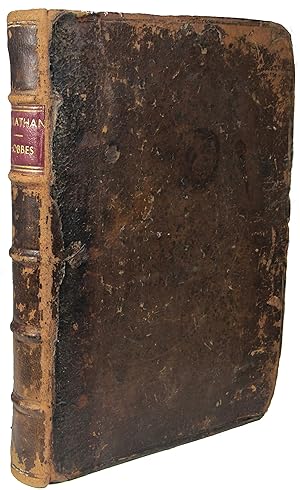


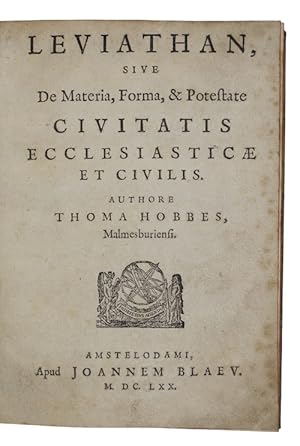
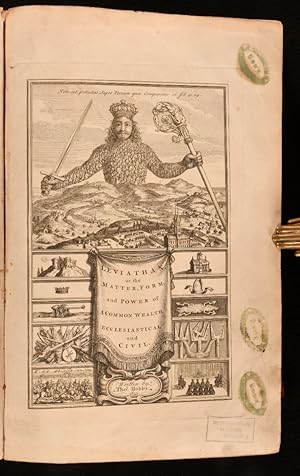
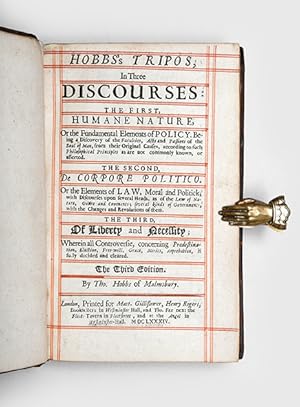
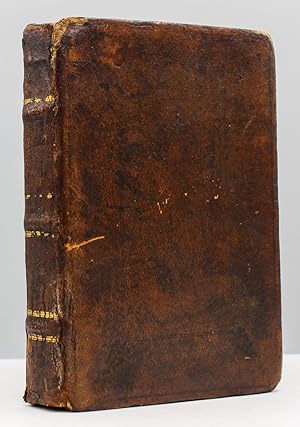
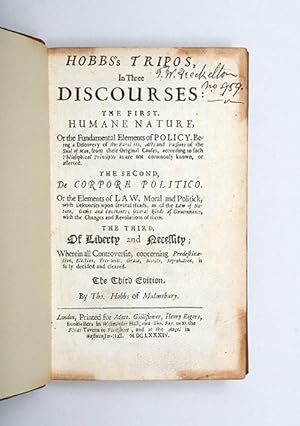
![Bild des Verkäufers für 1- HOBBES, [HOLBACH, traduction, édition]. De la Nature Humaine, ou Exposition des facultés, des actions & des passions de l'Ame, & de leurs causes déduites d'après des principes philosophiques qui ne sont communément ni reçus ni connus. Par Thomas Hobbes; Ouvrage traduit de l'Anglois [par le baron d'Holbach]. Londres [i.e. Amsterdam, Marc-Michel Rey], 1772. (4), iv, 171 p. [Suivi de] 2- [FAIGUET DE VILLENEUVE]. Légitimité de l'usure légale où l'on prouve son utilité; que les casuistes sont en contradiction avec eux-mêmes. Monts de piété. Pratique injuste de la poste. Où l'on discute les passages de l'Ancien & du Nouveau Testament sur l'usure &c. Amsterdam, Marc-Michel Rey, 1770. (4), 168 p. zum Verkauf von Librairie HATCHUEL](https://pictures.abebooks.com/inventory/md/md31358503255.jpg)
![Bild des Verkäufers für uvres philosophiques et politiques. Tome premier, contenant les Élémens du Citoyen, traduits en François, par un de ses amis; [together with] Tome second, contenant le Corps Politique & la Nature humaine. zum Verkauf von Peter Harrington. ABA/ ILAB.](https://pictures.abebooks.com/inventory/md/md22868812751.jpg)
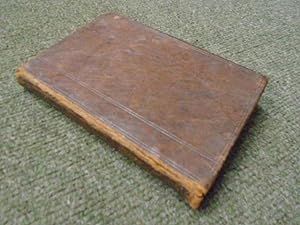
![Bild des Verkäufers für Elementa Philosophica de Cive; Epistolica Dissertatio de Principiis Ivsti, et Decori, Continens Apologiam pro Tractatu Clarissimi Hobbaei, De Cive; & Thomae Hobbes Angli Malmesburiensis Philosophi Vita [3 volumes in 1] zum Verkauf von Keoghs Books](https://pictures.abebooks.com/inventory/md/md15158790345.jpg)
![Bild des Verkäufers für Le corps politique ou les elements de la loy morale et civile. Avec des Reflections sur la Loy de Nature, sur les Serments, les Pacts, & les diverses sortes de Gouvernemens; leurs changemens, & leurs revolutions. Par Thomas Hobbes, Anglois. Traduit d'anglois en françois par un de ses amis.- [Sigue:] Le politique du temps, Traitant de la puissance, autorité, & du devoir des Princes: des divers Gouvernemens, jusques où l'on doit supporter la tyrannie. Et si en une oppression extréme il est loisible aux sujets zum Verkauf von Andarto B.](https://pictures.abebooks.com/inventory/md/md31821827574.jpg)

![Bild des Verkäufers für Elemens philosophiques du citoyen. Traicté politique où les Fondemens de la Societé civile sont découverts, par Th.Hobbes et traduit en françois par un de ses amis [Sam. Sorbière] zum Verkauf von Libreria Ex Libris ALAI-ILAB/LILA member](https://pictures.abebooks.com/inventory/md/md5979649570.jpg)
